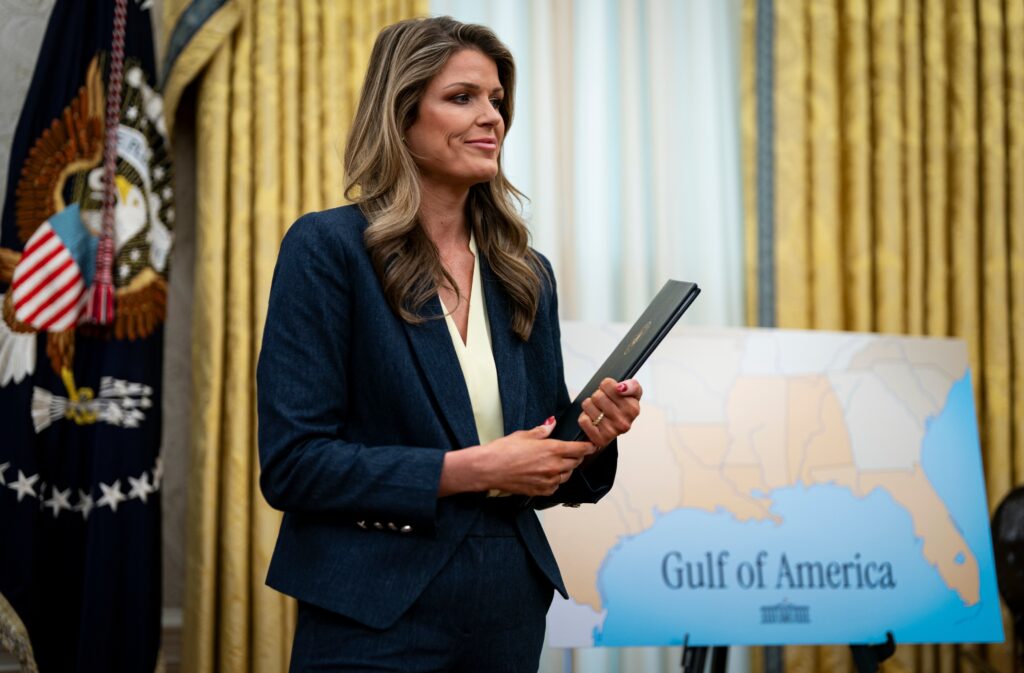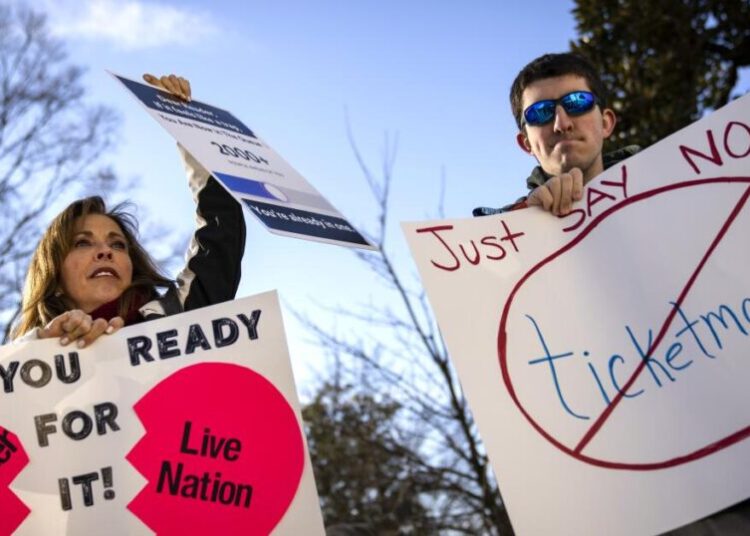The criminal cases against former FBI director James B. Comey and New York Attorney General Letitia James may be over for now. But a federal judge’s ruling Monday disqualifying the U.S. attorney overseeing their prosecutions and dismissing the charges left a number of questions unresolved.
Most significantly: What happens next?
The Justice Department spent Tuesday mulling options, including a possible appeal of U.S. District Judge Cameron McGowan Currie’s decision declaring the appointment of Lindsey Halligan as interim U.S. attorney for the Eastern District of Virginia invalid.
The ruling also sent prosecutors scrambling to reexamine their cases against Comey and James with an eye toward potentially seeking new indictments.
Currie’s decision could also have significant ramifications for one of the most important U.S. attorney’s offices in the nation, which appeared in considerable disarray in the ruling’s aftermath. Halligan has been leading the office since late September. And the decision threw into doubt President Donald Trump’s campaign to use the Justice Department as a tool for retribution against his political adversaries.
Comey had been charged with lying to Congress during a 2020 Senate hearing when he was asked whether he’d ever authorized leaks to the news media. James was indicted on mortgage fraud claims, tied to her 2020 purchase of a Norfolk home. Both have denied the allegations and vowed to fight any effort to indict them again.
Here’s a look at some of the most pressing questions that remain now that their cases have been thrown out:
Will the Justice Department indict Comey and James again?
Attorney General Pam Bondi said Monday that the Justice Department will appeal the decision, though no formal notice of that decision had been filed Tuesday morning.
Even as an appeal plays out, department officials could seek to indict Comey and James again using a prosecutor whose authority is not in question.
Currie, in her opinion Monday, declined a defense request to dismiss the cases “with prejudice,” which would have barred the Justice Department from seeking new indictments.
Prosecutors could have until 2030 to try to refile the mortgage fraud case against James. That’s when the 10-year statute of limitations expires on allegations that she lied to obtain more favorable loan terms while purchasing the Norfolk home in 2020.
For Comey, the situation is more complicated.
The former FBI director was charged with lying during testimony before the Senate Judiciary Committee in September 2020. Halligan obtained his indictment just days before the five-year statute of limitations on that alleged crime was set to expire.
Now that the case has been thrown out well past that deadline, Comey’s lawyers maintain that prosecutors are time-barred from seeking to charge him again.
The Justice Department contends that federal law grants them six months for a do-over, when a felony indictment is dismissed “for any reason” once the statute of limitations window has closed.
Currie did not specifically prohibit prosecutors from seeking another indictment. However, she suggested in a footnote to her opinion that her view aligned with Comey’s.
Because Halligan was never lawfully serving as U.S. attorney, the original indictment she obtained against Comey was never valid, Currie reasoned. Therefore, there were never any legitimate charges filed against Comey within the five-year deadline, and the six-month window for the Justice Department to correct its mistakes would not apply.
If the Justice Department tries for a new indictment against Comey over his 2020 Senate testimony, that dispute over deadlines is likely to dominate defense efforts to have the charges dismissed.
What about other arguments Comey and James have raised?
Currie’s decision to throw out the cases Monday was based on the most technical argument Comey and James had made challenging the cases against them: Halligan’s legitimacy as U.S. attorney.
Both had also sought dismissals on grounds that their prosecutions were motivated not by legitimate law enforcement interests, but rather by Trump’s long-standing animosity toward them.
Comey’s lawyers had separately raised concerns over procedural irregularities in the presentation of his case to the grand jury, including questions over whether Halligan ever presented a final version of that charging document to the full panel considering the case.
Currie’s decision is likely to put those issues on the back burner while any Justice Department appeal of Halligan’s disqualification moves forward.
Currie’s decision dismissing the cases may serve as a blessing in disguise for the Justice Department, at least in regard to the grand jury irregularities that Comey’s lawyers have flagged. Should prosecutors try to reindict Comey, they’re likely to avoid several of the issues in Halligan’s grand jury presentation that have drawn scrutiny from judges.
What happens to Halligan now?
The Justice Department has not made moves to remove Halligan from the post in the Eastern District of Virginia. Currie’s ruling, however, cast doubt on whether the office can function as intended with Halligan at the helm.
A federal statute says the nation’s 93 U.S. attorneys are the source of the government’s power to prosecute crimes and participate in civil litigation within their districts, except as otherwise provided by law. That’s why the U.S. attorney is usually included as the first signatory in the government’s court filings.
“All actions flowing from Ms. Halligan’s defective appointment, including securing and signing Mr. Comey’s indictment, were unlawful exercises of executive power and are hereby set aside,” Currie wrote in her ruling.
The issue that led to her ruling involves the time limit for making interim appointments when the Senate has not confirmed a U.S. attorney nominee. The law gives the attorney general the right to appoint an interim U.S. attorney for 120 days. After that, if no nominee has been confirmed, the judges in the judicial district get to pick.
Halligan’s predecessor, Erik S. Siebert, served 120 days as an interim U.S. attorney and then was kept on by the judges before Trump forced him out. Currie ruled that the administration cannot make another interim appointment.
“The power to appoint an interim U.S. Attorney for the Eastern District of Virginia … during the current vacancy lies with the district court until a U.S. Attorney is nominated by the President and confirmed by the Senate,” she wrote.
After Comey and James were indicted, and Halligan’s appointment was challenged in court, Bondi issued orders naming Halligan a “special attorney” with the power to prosecute crimes. Currie ruled that those retroactive orders were legally deficient.
But the judge did not expressly order Halligan to vacate the position.
Inside the U.S. attorney’s office, there was confusion Monday about whether to remove Halligan’s name from court filings going forward. An official in the prosecutor’s office initially sent two staff-wide emails asking government lawyers to include the first assistant U.S. attorney, Robert K. McBride, atop the signature block instead of Halligan.
About an hour later, another official sent an email saying: “The change to the signature block was premature. Please return to the use of Lindsey Halligan, United States Attorney.”
The confusion continued Tuesday, with officials postponing some decisions until after Thanksgiving in the hopes of gaining greater clarity.
If Halligan were to leave the office, McBride, the second-highest-ranking official, would assume the role of acting U.S. attorney. He was recently named to his position after the Justice Department purged several high-ranking prosecutors who had served for years in the Alexandria, Virginia, office.
Does the Halligan decision affect other cases?
Currie did not spell out how her ruling should affect other prosecutions pursued during Halligan’s short stint as U.S. attorney.
Other judges who have ruled on challenges to Trump’s U.S. attorney picks have declined to dismiss criminal cases, noting that career prosecutors whose authority is not in question were involved in bringing those charges.
That standard will probably extend to most of the other prosecutions brought under Halligan’s watch. The Comey and James cases were unique, the judge noted, because Halligan was the only prosecutor to appear before the grand jury.
“This case presents the unique, if not unprecedented, situation where an unconstitutionally appointed prosecutor, exercising ‘power [she] did not lawfully possess,’ acted alone in conducting a grand jury proceeding and securing an indictment,” Currie wrote.
The question of Halligan’s legitimacy is also being litigated in another case, the prosecution of Mohammad Sharifullah, who is accused of plotting the Abbey Gate bombing that killed 13 U.S. service members and scores of civilians who were attempting to evacuate from Afghanistan in 2021. Federal public defenders for Sharifullah have filed a motion to disqualify Halligan as the U.S. attorney in that case.
But that case was presented to the grand jury by prosecutors who were legally qualified to request an indictment. They were working under Siebert, whose appointment was never under legal question.
Sharifullah’s public defenders did not request that the indictment be dismissed, only that Halligan be disqualified.
Does Halligan’s disqualification affect Trump’s other U.S. attorney picks?
Halligan is the best known of the administration’s U.S. attorney picks to have her appointment declared invalid, but her disqualification is part of a broader legal fight that appears bound for the Supreme Court.
Judges have already ruled that three other Trump-appointed U.S. attorneys are serving unlawfully: Alina Habba, the top federal prosecutor in New Jersey, Bill Essayli in Los Angeles and Sigal Chattah in Nevada. Challenges remain pending against Ryan Ellison, the acting U.S. attorney in New Mexico, and John Sarcone III, the top federal prosecutor in Albany, New York.
Most of those cases focus on a different law governing U.S. attorney appointments than the one at the center of the Halligan case. But at their core, all revolve around the administration’s expansive view of its authority to fill U.S. attorney vacancies while bypassing Senate confirmation.
As several of Trump’s picks have faced opposition in the Senate, the administration has relied on a novel interpretation of federal laws to keep some of his more controversial candidates in their posts.
Judges who have ruled on the issue so far — including appointees of both Republican and Democratic presidents — have consistently shot down the administration’s reading of those statutes. The Justice Department has dismissed their rulings and attacked them as “activist judges.”
Bondi said Monday that the department would continue to fight for Halligan’s appointment, as it has done in those other cases.
The post What comes next in the James Comey and Letitia James cases? appeared first on Washington Post.




